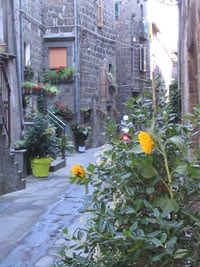The Writer’s Journey: Susan Tekulve’s Italian Travel Class

“There, where the road ends, the real journey begins.” Campbell McGrath
For most of us, Italy, like many European destinations, is a place to savor great foods and historic locations. We might walk the narrow streets surrounding the Campo de’ Fiori, take snapshots of the Vatican or buy trinkets outside the Coliseum. But for American writers from Herman Melville to Ernest Hemingway to Elizabeth Bishop, travel has provided surprises, challenges and inspiration. It is this search for inspiration and a connection to a larger, global culture that brought a group of Converse College creative writing students and Professor Susan Tekulve to the vine-draped villas and cobbled streets of Rome for a creative writing course in travel writing.
Over a period of nearly four weeks in the summer, the Converse group studied Italian, practiced the art of Italian cooking, visited many of the historic, artistic and ecclesiastic monuments of Rome, visited with other writers—and wrote.
“Most of us wrote some everyday,” said Converse writing student Gabrielle Gray. “Professor Tekulve would have conferences with us about the essays we were writing in a local cafe over lunch.”
 Tekulve, a published short story writer, essayist and member of the English Department’s writing faculty, explains that the group immersed themselves in the art of travel writing before they even boarded the plane. “We spent about six weeks in the classroom discussing specific writing techniques and strategies, and looking at different forms of the travel essay,” she says. “Because these aren’t academic essays, but, instead, are like the travel essays you might find in The Atlantic Monthly or The New Yorker, the students had to look at ways to use narrative and description as if they were writing fictional short stories.”
Tekulve, a published short story writer, essayist and member of the English Department’s writing faculty, explains that the group immersed themselves in the art of travel writing before they even boarded the plane. “We spent about six weeks in the classroom discussing specific writing techniques and strategies, and looking at different forms of the travel essay,” she says. “Because these aren’t academic essays, but, instead, are like the travel essays you might find in The Atlantic Monthly or The New Yorker, the students had to look at ways to use narrative and description as if they were writing fictional short stories.”
The students wrote about everything from travels to the Villa d’Este and its 16th century garden fountains, to a memoir about being a Baptist-raised student attempting to understand her first experience in a Roman Catholic church.
“Travel writing is one of the oldest narrative forms in existence,” Tekulve says. “When authors write about other places and cultures, they begin to understand their connection to a larger world, but they also begin to understand their own hometowns, their own culture. Living as an outsider, even briefly, can be an awakening experience.”
“When authors write about other places and cultures, they begin to understand their connection to a larger world, but they also begin to understand their own hometowns, their own culture.”
That sentiment is shared by Tekulve’s husband, Professor Rick Mulkey, Director of the Creative Writing Program at Converse. “Travel isn’t only about the search for pleasure,” says Mulkey. “The author Paul Theroux calls himself an anti-travel writer. What I think he means is that for writers travel isn’t just about vacations, about the flavors and scents of a cafe or restaurant. It is about the total experience. Several years ago we spent eight months living and teaching in Poland. Everything about that time was beneficial because I don’t think we quite understood what it meant to be an American writer until we lived in another culture and discovered what other people desired and needed, and what they thought of us as Americans.”
Travel study is nothing new to Converse College. As Mulkey points out, the English Department has been very active for many years in travel programs. “The course last summer and Susan’s upcoming Winter Term course to Tuscany with Professor Cathy West in the department of Foreign Languages are not the first travel courses offered through the English Department. Professors Karen Carmean and Charles Morgan have participated in a number of courses in recent years. For instance, Professor Morgan is offering a literature course as part of the upcoming London Term. But Susan’s courses are the first creative writing courses offered in the travel program. It is very important for our student writers to have an opportunity to step outside their comfort zones. The challenges provided by travel study and the lessons learned by a writer who analyzes and deciphers her experiences through the act of writing are priceless.”